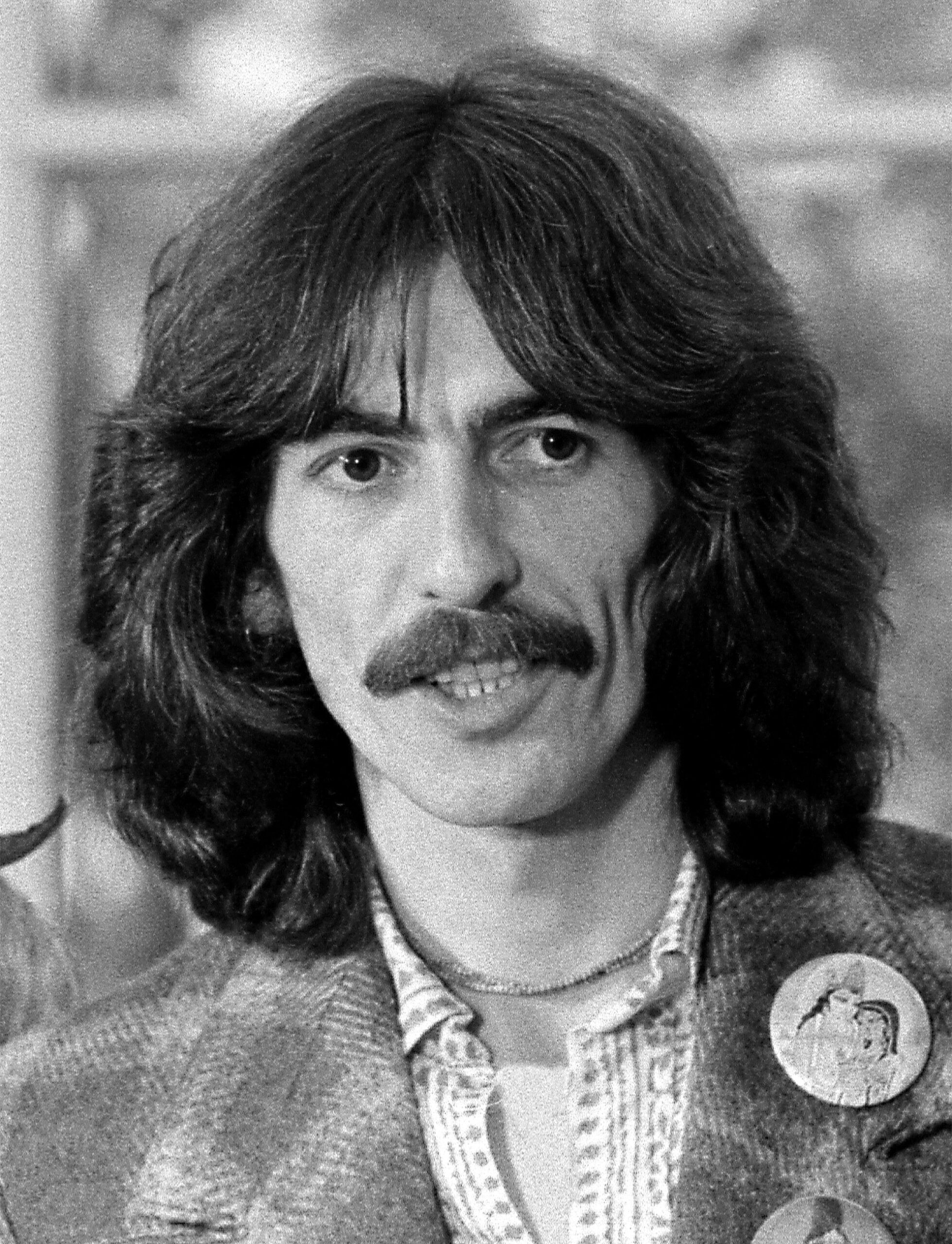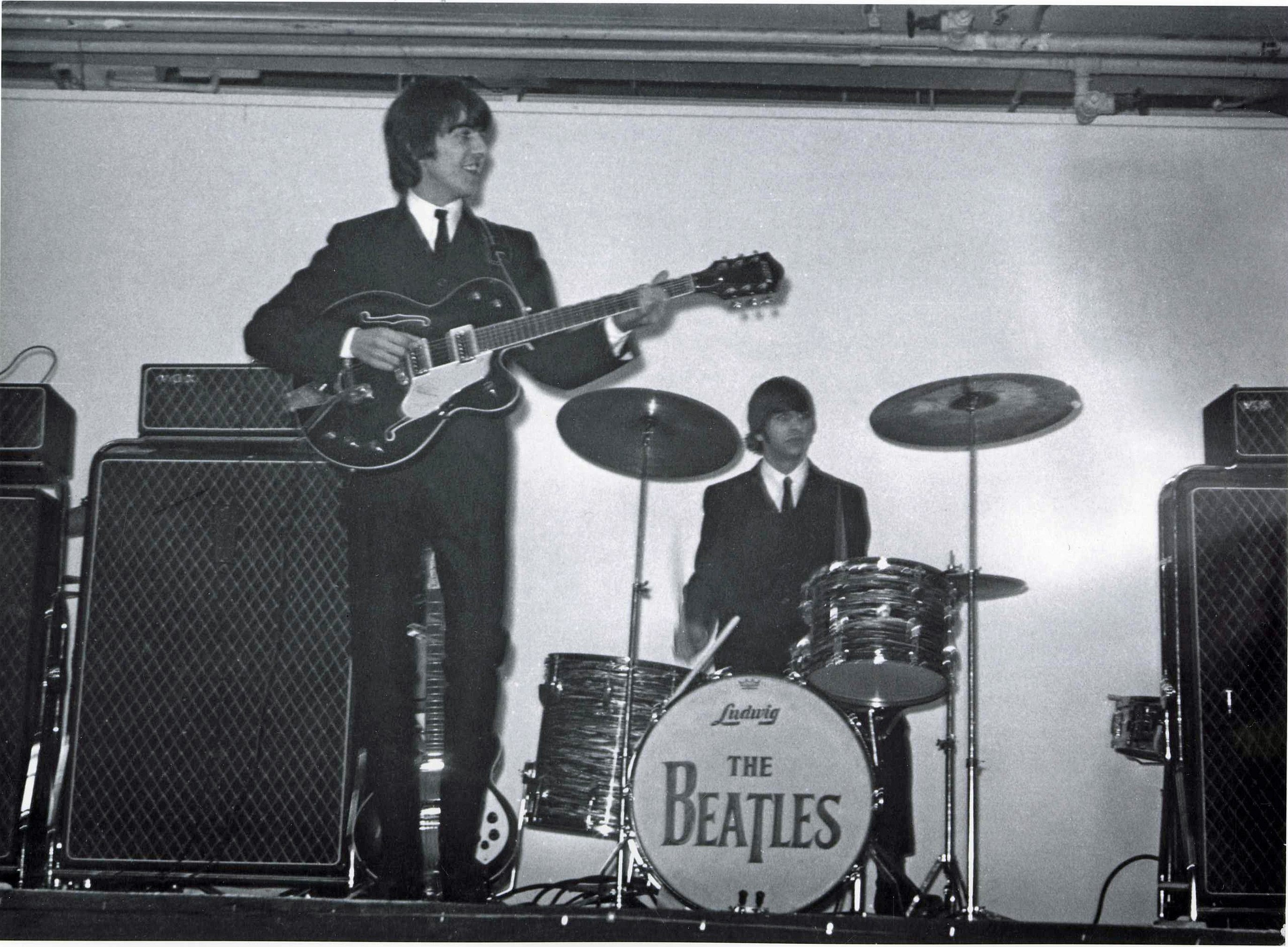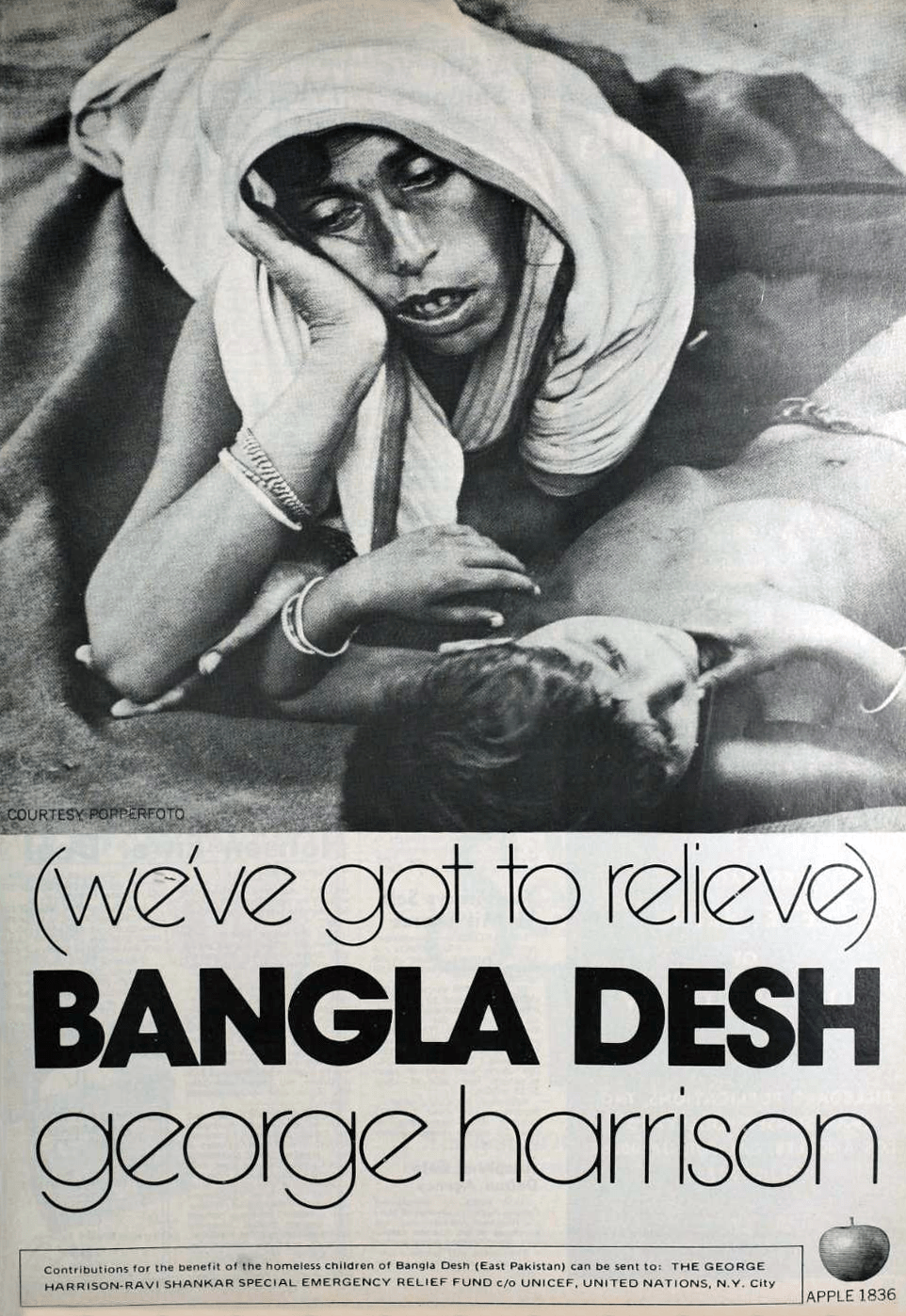George Harrison (born February 25, 1943 – died November 29, 2001) was singer-songwriter and musician who first gained worldwide fame as the lead guitarist of the Beatles. While mates John Lennon and Paul McCartney were the band’s primary songwriters, Harrison also did his share in composing many of the Beatles’ memorable songs such as “Here Comes The Sun”, “While My Guitar Gently Weeps” and “Something” which is one of the group’s most-covered songs. He was also known as “The Quiet Beatle”.
A devotee of Indian music, Harrison also introduced the mystical Eastern/Indian elements on the group’s sound (as well as the whole of Western music) as evidenced by “Norwegian Wood” and “Within You, Without You”.
After the Beatles, Harrison embarked on a considerably successful solo career. He achieved many hits such as “My Sweet Lord”, “Give Me Love (Give Me Peace On Earth)”, “All Those Years Ago”, and “I’ve Got My Mind Set On You”. Harrison’s 1971 album All Things Must Pass was his most successful album in his career, garnering top chart positions all over the world. Harrison also organized one of music history’s benefit concerts such as 1971’s Concert for Bangladesh, as part of his humanitarian work. Harrison was part of the supergroup The Traveling Wilburys in 1988-1990; their two studio albums were multi-platinum successes. In the 1990s, he collaborated with the other surviving Beatles for their Anthology albums. Harrison died in 2001.
Harrison’s Early Life and Career, and as a Beatle
George Harrison was born on February 25, 1943 in Liverpool, England. Unlike the other three Beatles, Harrison had a happy childhood, by all accounts. He first displayed his interest in music when he was younger, and while inside classroom he kept on doodling his notebooks with drawings of guitars. He received his first guitar when he was 14 years old and started to learn a few chords. Like his future Beatles bandmates, George also adored Elvis Presley, Buddy Holly, Carl Perkins, Little Richard, and skiffle king Lonnie Donegan.
Harrison met schoolmate Paul McCartney, and they bonded over their love of music. After painstaking guitar lessons, Harrison finally had great command over the instrument. He tried to join the Quarrymen but was rejected at first because he was too young compared to his peers. With McCartney’s help, the band’s leader John Lennon reluctantly allowed Harrison in as a member of the band, in part because Harrison sampled the lead guitar part of the rock and roll instrumental “Raunchy.”
By 1960, the band was renamed “The Beatles” and had begun making rounds in Liverpool as well as Hamburg, Germany. A couple of years later, the band gained a manager in young entrepreneur Brian Epstein, then sacked their longtime drummer Pete Best and replaced him with Ringo Starr. The magic formula for the most successful band in music history was now complete, with Harrison being the lead guitarist and occasional singer.
During the height of Beatlemania, Harrison was often overshadowed by Lennon and McCartney especially in song contributions and singing parts. But he held his own, eventually writing fine tunes such as “I Need You” and “If I Needed Someone.” On 1965’s Rubber Soul, Harrison first introduced Indian/Eastern music by playing sitar in “Norwegian Wood.” His indulgence in this kind of music was again evident in “Within You, Without You” from Sgt. Pepper’s Lonely Hearts Club Band (1967) and the B-side single “The Inner Light” (1968), both of which were written also by himself.
As the years went by, Harrison’s songwriting grew more confident and could now be considered at par with Lennon and McCartney’s output. He wrote many of the Beatles’ most memorable tunes such as “My Guitar Gently Weeps” (whose lead guitar was played by friend Eric Clapton), “Here Comes The Sun” and “Something,” the last of which has become one of the most-covered Beatles songs. Along with Eric Clapton, George Harrison is also considered to be one of the best guitarists of the 1960s. To learn more about the other guitarists that became popular in the 60s, you can read our list of The 10 Best Guitarists of the 1960s.
George Harrison contributed some significant songs to The Beatles’ catalog. His songwriting evolved remarkably over the years, and he became known for his spiritual and introspective lyrics, as well as his distinctive guitar playing. Here are some of the top songs written by George Harrison for The Beatles:
- “Something” (1969): Featured on the album “Abbey Road,” this song is one of Harrison’s most famous compositions and was a rare instance of a Beatles A-side single written by him. It’s often considered one of the greatest love songs of all time.
- “While My Guitar Gently Weeps” (1968): From the “White Album,” this song features Eric Clapton on lead guitar and is known for its poignant lyrics and compelling melody.
- “Here Comes the Sun” (1969): Also from “Abbey Road,” this upbeat and optimistic song is one of Harrison’s most beloved contributions to The Beatles’ repertoire.
- “Taxman” (1966): Opening the “Revolver” album, this song was a commentary on the high levels of progressive tax taken by the British government at the time. It’s notable for its sharp, biting lyrics and distinctive guitar riff.
- “Within You Without You” (1967): A song from the “Sgt. Pepper’s Lonely Hearts Club Band” album, it showcased Harrison’s deep interest in Indian music and philosophy.
- “I Me Mine” (1970): The last song recorded by The Beatles before their breakup, featured on the “Let It Be” album. The song reflects Harrison’s frustration with the egos and conflicts within the band.
- “Blue Jay Way” (1967): Featured on the “Magical Mystery Tour” album, this song is named after a street in Los Angeles and has a dreamy, psychedelic sound.
- “Love You To” (1966): Another track from “Revolver,” this song marked one of the first instances of Indian music being used in a pop song by a Western band.
- “If I Needed Someone” (1965): From the album “Rubber Soul,” this song was influenced by Indian music and was Harrison’s first composition to be included on a Beatles album.
- “The Inner Light” (1968): Released as the B-side to “Lady Madonna,” it was another example of Harrison’s exploration of Indian music and philosophy.
While still with the Beatles before their breakup, Harrison had already been involved in recording and releasing his first solo album Wonderwall in 1968, making it the first official solo album release of any Beatle. He followed this with 1969’s Electronic Sound which was even more adventurous and experimental in nature and featured a Moog synthesizer.
Solo Career
After the Beatles split in early 1970, Harrison released his third solo LP later that year, All Things Must Pass. A triple album, it yielded the hit singles “My Sweet Lord” and “What Is Life,” as well as featured the title track that Harrison had previously recorded while he was with the Beatles. In the midst of the success of “My Sweet Lord,” Harrison was sued for copyright infringement for plagiarizing the Chiffons hit “He’s So Fine” (written by Ronnie Mack), as the two songs carry similar styles. He lost in this case. Still the song’s album went triple platinum, and up to now has still been regarded as Harrison’s finest solo record.
Harrison became actively involved in charitable work especially for the poor countries in the East. He organized the two benefit concerts named Concert For Bangladeshwhich were held at the Madison Square Garden in New York City, 1971. It was a groundbreaking success, raising a lot of money for the Bangladesh relief effort. The concert was transferred into a very successful album of the same name.
Not all was running smoothly in Harrison’s post-Beatle life and career. He and wife Patti Boyd divorced in 1974, and his other albums such as Living In The Material World, Extra Textureand 33 1/3 failed to capture the audiences. Some of his top hits from his post-Beatles career include:
- “My Sweet Lord” (1970): From his triple album “All Things Must Pass,” this was Harrison’s first major single as a solo artist and became a huge international hit. The song is notable for its spiritual theme and the famous “Hallelujah” chorus.
- “What Is Life” (1970): Also from “All Things Must Pass,” this song was a successful single and is known for its upbeat tempo and catchy melody.
- “Give Me Love (Give Me Peace on Earth)” (1973): This track from the album “Living in the Material World” was a number one hit in the US. It reflects Harrison’s yearning for spiritual fulfillment.
- “Isn’t It a Pity” (1970): Released as a double A-side with “My Sweet Lord,” this song is a commentary on the human condition and was another critical and commercial success from “All Things Must Pass.”
- “All Those Years Ago” (1981): A tribute to John Lennon, who had been assassinated the previous year, this song from the album “Somewhere in England” featured vocals and instrumentals by Paul McCartney and Ringo Starr, making it a quasi-Beatles reunion.
- “Got My Mind Set on You” (1987): From the album “Cloud Nine,” this cover of an old R&B song became a number one hit in the US and is known for its catchy and upbeat tune.
- “Blow Away” (1979): A single from his self-titled album, “George Harrison,” this song was a hit and is remembered for its light, breezy melody and optimistic lyrics.
- “Crackerbox Palace” (1976): From the album “Thirty Three & 1/3,” this song was a hit single and known for its quirky lyrics and music video.
- “When We Was Fab” (1987): Also from “Cloud Nine,” this song was a nostalgic look back at his Beatles days, complete with a psychedelic music video reminiscent of the era.
- “Dark Horse” (1974): The title track of his 1974 album, “Dark Horse,” although not as commercially successful as some of his other singles, it was notable for its autobiographical lyrics and marked a shift in his musical style.
Harrison sought out other business ventures. He established his own label, Dark Horse, and own film production company Handmade Films, whose box-office hits included Monty Python’s Life Of Brian.
Harrison’s Later Career and Death
In 1978 Harrison married his second wife Olivia Arias; together they had a son Dhani who was born a month before their wedding. In 1979 he began recording Somewhere In England and had also recorded a track called “All Those Years Ago,” which was then left hanging.
However, after Lennon’s murder in December 1980 Harrison decided to rework and then include “All Those Years Ago” in Somewhere In England. The single became Harrison’s tribute to his former Beatle bandmate and friend. “All Those Years Ago” was a huge hit too, peaking at #2 on the US Billboard Hot 100 in 1981.
Harrison followed this up with Gone Troppo in 1982, which didn’t meet sales expectations. After some hiatus, Harrison resurfaced in 1987 when his album Cloud Nine broke into the Top 10 album charts of both US and UK, thanks to the single “Got My Mind Set On You.” The following year he formed the supergroup The Traveling Wilburys along with Roy Orbison, Jeff Lynn, Tom Petty and Bob Dylan. The group’s two albums proved to be so successful that a major tour soon followed.
Harrison got quite a scare in 1999 when a man broke into his mansion and attacked him with a knife, until his wife Olivia successfully intervened with the assailant. Two years later, Harrison was being treated for lung cancer, but it was far too late as the the disease had spread to his brain. On November 29, 2001, George Harrison passed away. He was 58 years old. His album Brainwashed was released posthumously in 2002, and had been completed by Lynne and George’s son Dhani, who is also a musician himself.
Harrison’s Impact and Influence
There have been numerous compilations and re-releases of Harrison’s material since his death. Few of those are the re-issue of Dark Horse and his Concert For Bangladesh album. Director Martin Scorsese produced George Harrison: Living In The Material World, a documentary covering Harrison’s life and music; it was released in the fall of 2011.
George Harrison’s impact on pop culture extends beyond his music, both as a member of The Beatles and as a solo artist. His influence can be seen in various aspects of popular culture:
- Concert for Bangladesh (1971): Harrison organized this pioneering charity concert, one of the first of its kind, to raise awareness and funds for refugees from East Pakistan (now Bangladesh). This event set a precedent for future large-scale charity concerts like Live Aid.
- Indian Music and Spirituality: Harrison’s embrace of Indian music and spirituality in the 1960s played a significant role in popularizing these elements in Western culture. His use of the sitar and collaboration with Ravi Shankar introduced many in the West to Indian music and Hindu philosophy.
- Film Production: Harrison formed HandMade Films, a film production company responsible for several popular movies like “Monty Python’s Life of Brian” (1979) and “Time Bandits” (1981). His involvement in film production had a notable impact on the British film industry.
- Music Videos: Harrison was an early adopter of the music video format, creating innovative videos for his solo work that were precursors to the MTV era.
- The Traveling Wilburys: As a member of the supergroup The Traveling Wilburys, alongside Bob Dylan, Roy Orbison, Tom Petty, and Jeff Lynne, Harrison helped create a collaborative project that was both a critical and commercial success.
- Posthumous Tributes: After his death in 2001, Harrison was the subject of numerous tributes and memorials, reflecting his impact on music and culture. The 2002 “Concert for George” featured performances by many of his friends and collaborators.
- References in Film and Television: Harrison’s music and persona have been referenced in various films and TV shows, sometimes symbolizing the 1960s era or the broader cultural influence of The Beatles.
- Influence on Musicians and Songwriters: Harrison’s songwriting and musicianship have influenced countless artists across various genres. His blend of pop, rock, and Indian music, along with his spiritual and introspective lyrics, have inspired many musicians.
- Books and Biographies: Harrison’s life and career have been the subject of various books and biographical works, highlighting his contributions to music and popular culture.
- Induction into Halls of Fame: Harrison has been inducted into the Rock and Roll Hall of Fame twice: once as a member of The Beatles and again as a solo artist, underscoring his significant contributions to music.
Harrison was inducted into the Rock and Roll Hall Of Fame twice: as a member of the Beatles in 1988 and as a solo artist in 2004. His name has also cropped up on many lists of the greatest rock guitarists of all time.



